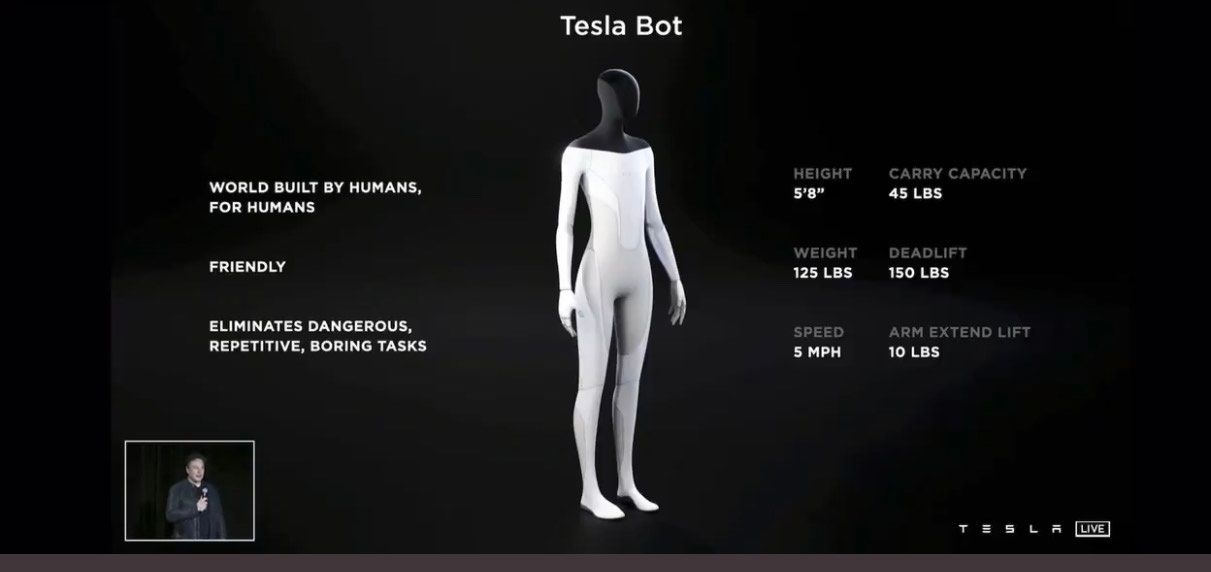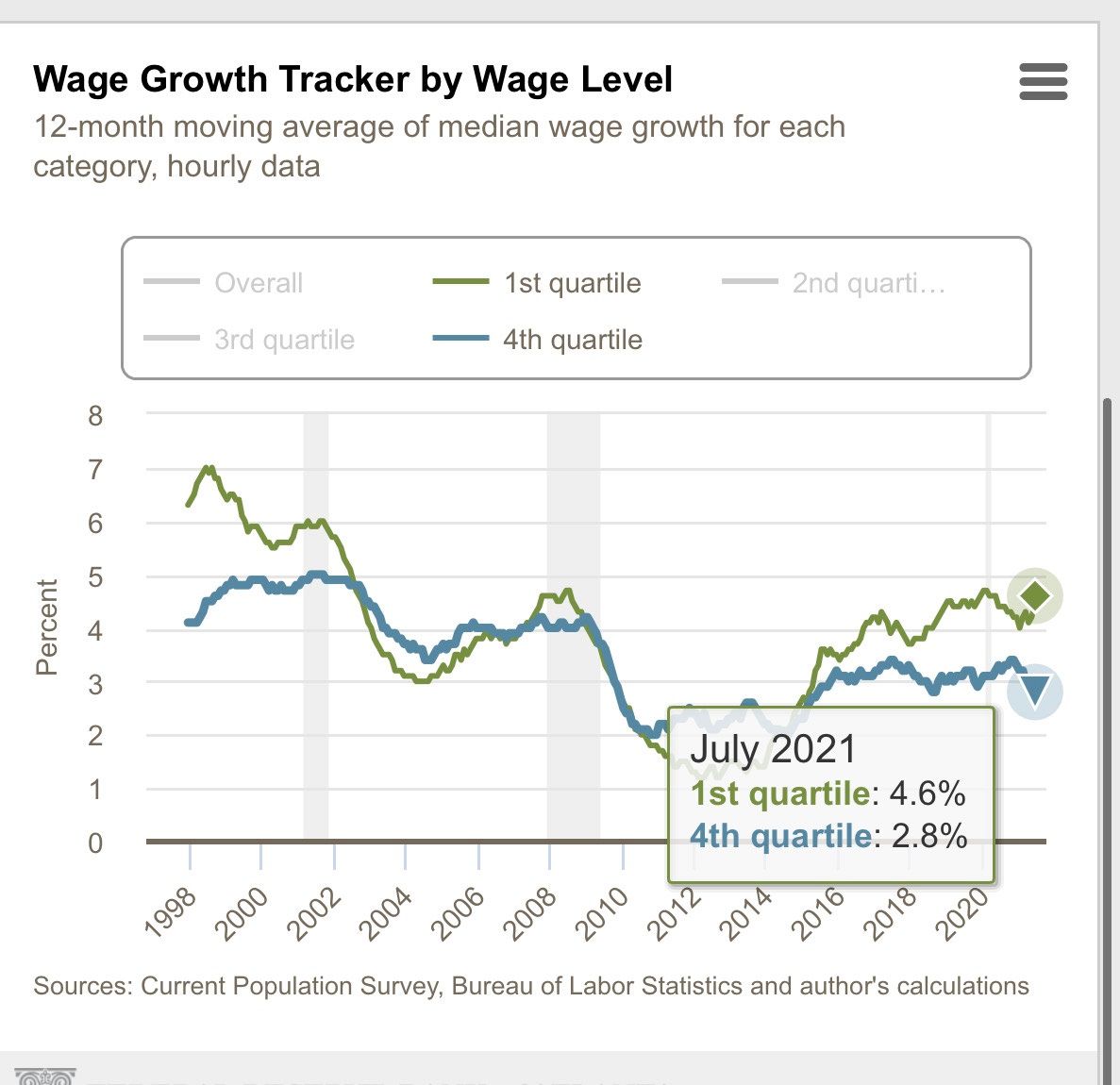Techopian's weekly roundup on some of the key stories covered this week. For those too busy during the week but need something to make them seem informed on Monday morning
Musk's fourth and fifth laws of robotics
Musk on UBI
Climate change will lead to more ESG
Data suggests digital transformation is benefiting the economy
This country wants to regulate excessively high incomes
Inflation genie returns to bottle
Biased or radical content on YouTube; is AI the solution?
Unintelligent intelligence services — the problem with intelligence is that we think we have it
Poorest getting richer
Musk's fourth and fifth laws of robotics
The first three laws of robotics are simple enough.
Rule one: A robot can not harm a human, by inaction allow a human to come to harm.
Rule Two: A robot must obey the orders given to it by human beings except where such orders would conflict with the First Law.
Rule three: A robot must protect its own existence as long as such protection does not conflict with the First or Second Law.
So, that's what Isaac Asimov said.
Now Tesla has revealed plans to make robots.

'We already make robots,' suggested Elon Musk — at least that's a paraphrase of what he said. Cars are robots.
For that matter, washing machines are robots too.
Neither cars nor washing machines obey any of Asimov's laws, but that is because we don't think it is necessary.
Once we start seeing robot soldiers, then applying the three laws might be rather choice — imagine a soldier that can't harm a human. That would change the nature of warfare a tad.
But when Musk revealed Tesla's plans for a robot, he said the robots would be made so that you can easily run away. In any case, most humans would be able to defeat one of his robots in a fight.
So there is your fourth law — make them run away-able. The only snag with that, of course, is that if robots do all the work for us, we might become so lazy that we would lose the ability to run away. So snails might become our racing target.
His fifth law might be for the robots not to be robots at all — rather, humans dressed up.
You can see it here, about 45 seconds into this video.
Obviously, it wasn't really a robot, just one of those men things dressed up.
Maybe the writer of this passage is the only human on Earth to be reminded of Chitty Chitty Bang Bang when seeing Musk's robot dance.
But then the latest Boston Dynamics robots have a terminator-esque feel about them. Not so sure you could run away from one of these. The original three laws might be apt for these critters.
Musk on UBI
Whilst Elon was busy telling the world about Tesla's planned robots; he dropped in a few words about universal basic income. He said: "In the future, physical work will be a choice," Musk said during the presentation. "This is why I think long term there will need to be a universal basic income."
As it happens, there is quite a difference here between the Musk rationale for UBI and what its main advocates think. For example, Musk worries about some kind of dystopian world in the future and says that we will need UBI when that happens. The UBI advocates we interviewed as part of our UBI series, by contrast, say that we need it now. So hang on in there; our video on the relationship between UBI and tech will be ready in a few weeks.
In the meantime, do take a look at our existing videos — they are beginning to become very popular.
Climate change will lead to more ESG
The penny is slowly dropping. As Climate change scientist Michael Mann argues here, July was a Frankenstein month created by the fossil fuel industry.
It also rained in July. For that matter, it is bucketing down as these words are written. But there was something different about the rain in July. Some of it fell on the summit of Greenland's icecap. This has never happened before; at least it hasn't happened since the moving of the continental shelves put Greenland where is it today.
There are still climate change deniers out there and indeed climate change delayers, but their numbers are diminishing. Just as Covid deniers are refusing to accept the existence of the disease, even as they are rushed to hospital with the virus, there will be climate change deniers sitting on low-level land denying climate change even as the sea laps against their feet.
But for most of us, it is hard to deny. That's a good thing because as acceptance grows, so does the will to do something about it.
But what will happen to the deniers? I don't mean the ordinary fellow blinded by populists. I mean the populists themselves who preach denialism because they think it is what their audience wants to believe. What about the corporations that do little about it? What about corporations that actively promote climate change delay? How might the public feel about them in a few years?
And if a large chunk of an electorate still denies climate change, how might that translate into division in society?
The popular backlash against deniers and those who nothing will be vicious; the wrath will be scary.
For corporations, the answer is ESG — adopt it or pay the price, long-term.
For politicians, accept the reality or accept that history will recall you as a criminal.
Data suggests digital transformation is benefiting the economy
But what do the numbers say? What is the evidence, as it were, from the coal face? We hear so much talk about digital transformation and working from home (WFH — not to be confused with WTF), but what does it really mean? What will the impact on the economy be?
Frankly, if the result of digital transformation and WFH on the economy is negligible, then cynics will look down smugly at Techopians and say, "WTF! WFH and digital transformation are just BS."
Maybe if the result of working from home is that the economy is neither bigger nor smaller, but workers are happier, then maybe we can conclude it is a good thing. Perhaps there is a nuance here concerning working from home — actually, it is more than nuance; it requires a different way of looking at the economy.
What does the data say?

This country wants to regulate excessively high incomes
The tea break, as they say, is over for billionaires. Billionaires have had their day; now it is time to regulate excessive incomes — at least, that is what one country is doing.
A commission chaired by the county's leader wants to "regulate excessively high incomes and encourage high-income groups and enterprises to return more to society." It also wants to create education that is "more inclusive," with "fair conditions for all people to improve their education level."
The commission suggested its move marks an end to "get rich first," replaced by "common prosperity for all".
How many people disagree with that? Would billionaires even agree with those sentiments?
There is. However, a word missing from the above narrative. That word is…well-read on (aren't we the tease?)

Inflation genie returns to bottle
The latest data on UK inflation supports recent data from the US suggesting that the inflation scare story from earlier this year was just that, a scare story.
The number that describes UK month-on-month inflation in July is round and fat and has a hole in the middle.
And no, it wasn't a polo mint:

Biased or radical content on YouTube; is AI the solution?
How serious is the problem of radical content on YouTube as a medium for promoting extremism? Researchers have been investigating.
"We find little evidence that the YouTube recommendation algorithm is driving attention to," FarRight and anti woke content, finds a study."
"Data suggests that YouTube's recommendation algorithm actively discourages viewers from visiting radicalizing or extremist content," finds another study.
So does that prove there is no link between YouTube and extremism? Well, let's not go so fast; there is nuance.

Unintelligent intelligence services — the problem with intelligence is that we think we have it
"How could we have been so stupid," said President John F Kennedy in 1961. In 2021, President Joe Biden might want to say something similar.
What he did say, however, on July 8th 2021, was:
"The Taliban is not the south—the North Vietnamese army. They're not—they're not remotely comparable in terms of capability. There's going to be no circumstance where you see people being lifted off the roof of an embassy in the United States from Afghanistan. It is not at all comparable."

Poorest getting richer
According to this chart, the three-month moving average growth in median wages saw an increase of 4.6 per cent for the first quartile — that's the poorest quarter and 2.8 per debt for the fourth quartile.

Hope you enjoy the newsletter, let us know by emailing info@techopian.com and if you really like it, send it to a friend you really care about.






Related News
A time to buy tech and the tech quintet to watch
Jan 03, 2023
Can social media defeat Russia?
Feb 25, 2022
1989: The failure of our 'moral' society
Feb 24, 2022